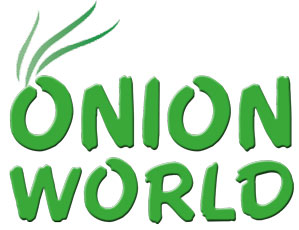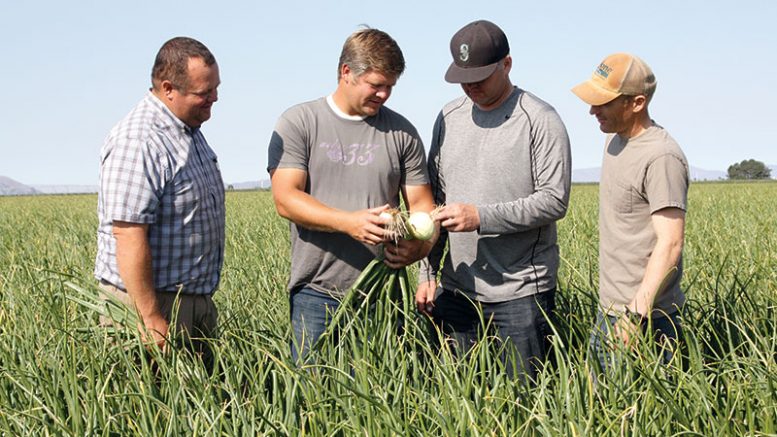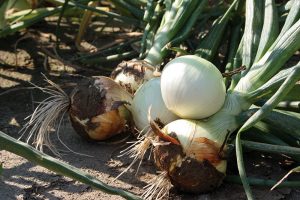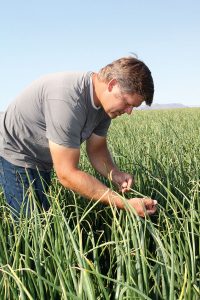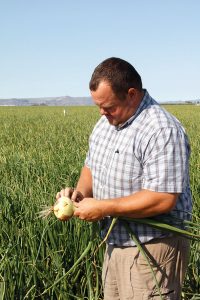Story and photos by Denise Keller, Editor
The Christensen and Bergeson families have always measured the success of their onion crop by the size of the bulbs. But since becoming a grower-packer, the perspective and priorities at Heritage Farms have expanded. As the growers balance size and yield with storability and pack-out, they combine four generations of farming know-how with a willingness to adapt.
Redefining a Niche
Two sets of brothers – Dan and Aaron Christensen and their cousins Chad and Ian Bergeson – manage the family farm, which includes 300 acres of onions. The Royal City, Washington, farm produces yellow and red onions mainly for the processing market, although smaller bulbs are skimmed off for the fresh market.
“We’re known for growing really large onions,” Dan says, explaining that size has long been the farm’s niche.
About five years ago, the growers started packing their own onions, first packing out of the cellar and steadily growing the operation each year. In 2018, they built the farm’s first onion storage shed. The building will allow for expansion and let Heritage Farms store onions until late spring or early summer. This will give the farm more control over sales and allow the growers to take advantage of ups and downs in the market. With the consolidation in the industry, the growers say venturing into the packing business was part of the natural progression of producing a commodity crop and seemed necessary to stay in the game.
Previously, as a producer, Heritage Farms focused on yield and bulb size. But since adding storage and packing to the business, the growers have begun to choose varieties that yield large bulbs to meet processing demand but also deliver storage quality and pack-out, in some cases giving up bulb size to gain storability.
“It has changed the farm a little bit. We’re growing some varieties that we wouldn’t have considered in the past because there wasn’t a purpose to sacrifice yield,” Dan says
What the growers won’t sacrifice is quality. Throughout the season, they take pride in caring for their crop. Recently, yellow nutsedge has been posing one of the greater threats to many local crops, able to choke out and reduce the size of an onion crop. While chemicals are available to stunt the vigorous weed, the growers say they lack an effective product to kill it.
At harvest, the growers minimize handling of the bulbs by topping and loading onions in a single step. The streamlined process, left over from the farm’s previous experience with fragile-skinned sweet onions, helps produce a superior product, according to Dan. But at the end of the day, it’s a combination of factors that determine the outcome of the season.
“When you look at all the decisions you have to make, it’s hundreds of decisions. So to grow large, quality onions, a lot of it comes from the knowledge of our dads. They’ve done it for the past 30 years so they know what to do and what not to do, when to apply a certain chemical – even a given hour of a day can make a difference. Timing is a big component,” the grower explains. “You have to be able to put all of those decisions in the right sequence to optimize the growth of the plant to its maximum capacity, if that’s your goal.”
Looking ahead, the growers are considering using onion transplants to get an early jump on the market and would like to build a brand around the farm.
“We’re known for growing really large onions and high quality, so we’re going to focus on that, keep growing steadily and hopefully get our products directly to stores with the Heritage Farms label,” Dan shares.
Four Generations and Counting
In addition to onions, Heritage Farms grows 700 acres of carrots, as well as wheat, beans and corn as rotational crops and another 120 acres of apples. The farm has dabbled in the production of other crops during its four-generation history.
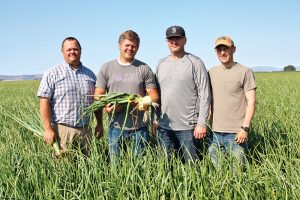
From left, Aaron Christensen, Dan Christensen, Chad Bergeson and Ian Bergeson discuss the quality of this year’s onion crop.
Dan, Aaron, Chad and Ian say their great-grandfather raised cattle and grew grains, hay and potatoes in Kittitas, Washington. Their grandpa and his three brothers moved to Royal City in the late 1950s after the Columbia Basin Project brought irrigation to the Royal Slope and were among the first families to farm there. The farm began growing onions in the mid-1980s. Shortly after, they took onions out of the rotation, but started growing them again in the mid-1990s. About that time, their fathers took the reins.
After growing up on the farm and attending college, Chad returned to the farm in 2002, Ian came home in 2012, Aaron followed the next year, and Dan joined the operation in 2017. Today, the four growers manage the family farm, combining what has worked in the past with what will be necessary to be profitable in the future.
“I don’t think you can totally discount things that previous generations have done that have been successful,” Chad says. “You have to take into account that experience, and it helps when they acknowledge that there are things that come along to help a process be more efficient or effective.”
“For any decision you’re making, whether you’re going to change a process or the way you grow something, there has to be a reason to do it,” Dan adds. “In the end, you’re trying to make money, so hopefully that decision either makes you more efficient or increases yield or gives you a better quality product.”
The growers say there’s still value in today’s ag market for quality products. This plays well for family farms. While large conglomerates focus on scale, efficiency and control of the market, Dan says small farms are all about quality.
“We have to concentrate on quality and doing it right. As long as we can control our costs, I think we can survive,” he adds.
In addition to quality, Heritage Farms’ diversification and the growers’ commitment to family are key to thriving as a family farm.
“You have to want to remain a family farm,” Ian comments. “Family is important to us.”
The growers want to be able to pass on land and a legacy to the next generation. They’re working to teach their children about farming and responsibility. With some of the growers’ oldest kids starting to help more on the farm, the next generation is taking its baby steps in becoming the fifth generation of Heritage Farms.
